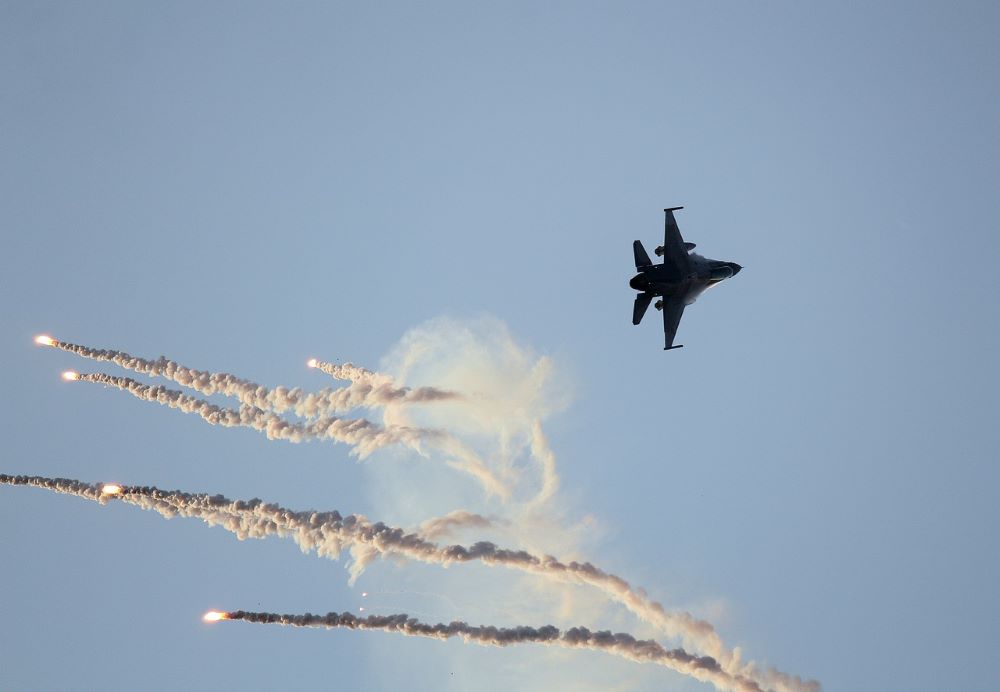Missile threat changes military power equation as Israel increasingly shifts to preemptive war doctrine, says top national security expert.

Israel can no longer avoid preemptive strikes to curb the military buildup of its enemies, says a leading national security expert. The dramatic threat posed by precision-guided missiles is increasingly forcing the IDF to take preventive action, even at the risk of sparking an all-out war.
For decades, Israel’s decisive advantages ensured that it could win any wars imposed on it, says Dan Schueftan, one of the country’s foremost strategic analysts. In this period, the IDF was boosting its power more effectively than rival armies, but that era is over, he argues in an extensive study published by INSS.
The growing ease of building advanced missiles and their devastating impact have fundamentally changed the equation, Schueftan says. The Iran axis can bypass the traditional battlefield if it fires thousands of precision missiles at Israel’s population centers, thereby eroding its military superiority and ability to decisively win wars.
Moreover, hostile forces like Hezbollah create a win-win situation by deploying rockets and missiles in civilian areas, the study says. Israel can either refrain from attacking urban centers to avoid civilian casualties, or face harsh global condemnation if it does strike to neutralize the threat.
The Syria campaign
Israel’s security doctrine is already shifting as the threat environment changes, Schueftan writes. In recent years, the IDF is engaged in a proactive effort to curb Iran’s military buildup in Syria, he notes.
The notion of Israel launching hundreds of airstrikes on thousands of targets would have been unthinkable 10 years ago. However, the ongoing bombings and covert actions may only be a prelude to a larger and much more aggressive preemptive campaign.

The most immediate threat faced by Israel is the huge arsenal of Hezbollah rockets, and especially the group’s plans to acquire precision missiles. Such munitions at the hands of Hezbollah would be a “game changer” that will likely force the IDF to launch a large-scale assault in Lebanon, a recent analysis by US and Turkish experts warned.
A previous study about a potential conflict on Israel’s northern border also highlighted the option of a preemptive war. If the IDF can no longer contain the emergence of a grave threat via a limited campaign, Israel may have no choice but to escalate its fight against Iran and its proxies, the INSS report said.
Preemptive war options
The analysis suggested three possible routes for Israel: A pinpoint strike to destroy Hezbollah’s precision project, a larger offensive to dismantle the Iran axis extending from Lebanon to Iraq, or a region-wide war against Tehran with battles on multiple fronts and strikes in Iranian territory
While Israel hopes to avoid a major war, the IDF is making extensive preparations for a broad Mideastern conflict. This includes large military exercises, intensive Air Force training for operations across the region, and an unprecedented test of Israel’s entire air defense arsenal.
In a recent meeting with IDF commanders, Chief of Staff Aviv Kochavi indicated that a large-scale war could erupt without warning. “The greatest illusion is that the next war will happen in a long time,” the army chief told his lieutenants. “You need to be ready for it to happen tomorrow morning.”
Kochavi also stressed that Israel can’t rely on air power alone to win future wars. “We can’t achieve victory against the enemy without a land maneuver and a massive incursion of forces,” he told the commanders. The IDF must strive to destroy at least 50% of the enemy’s strength and this can only be done by deploying ground forces, he said.
Based on this combat doctrine, the IDF is planning an invasion into Lebanon in the next conflict to quickly neutralize Hezbollah capabilities. The army is also preparing to deploy its most powerful artillery weapon, an upgraded cluster rocket that scatters dozens of grenades across a large area.


